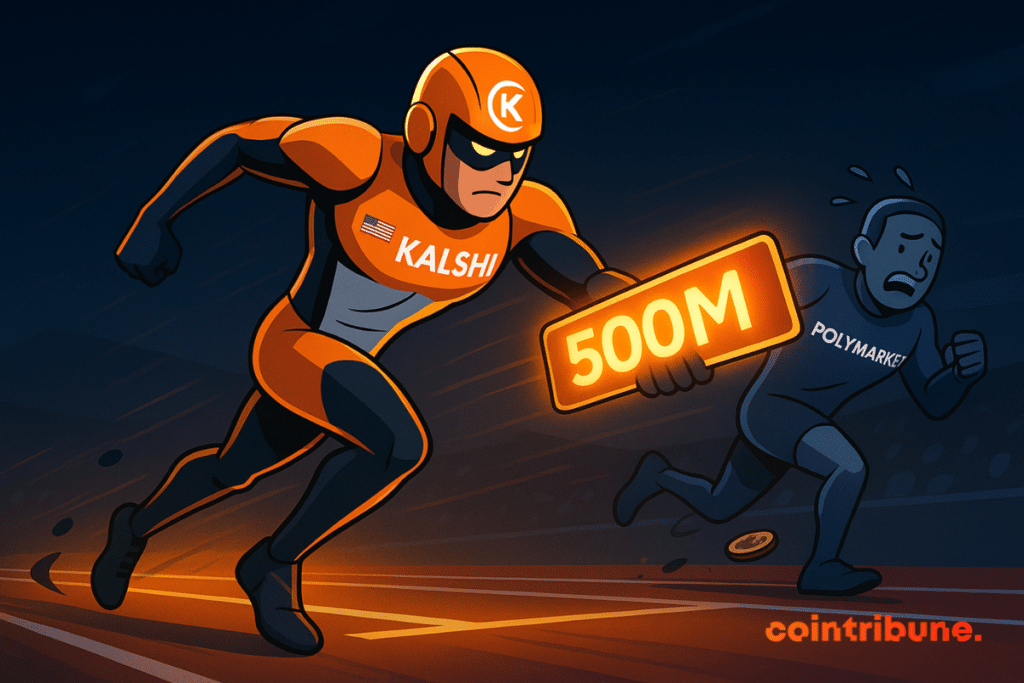Prediction Markets: Kalshi Takes the Lead Over Polymarket
The Web3 and the wave of decentralization that comes with it are only beginning. Every week, new innovations emerge, laying the foundations for an unprecedented digital future. Imagine these technologies at maturity: they could reshape finance, sports, or politics. This is exactly what is happening today with decentralized prediction platforms. Kalshi and Polymarket, two major players in this sector, are now engaged in a battle of volumes, regulation, and institutional recognition.

In brief
- Kalshi captures 62% of global volumes, compared to only 37% for Polymarket.
- Polymarket acquires QCX for $112 million to legally reenter the U.S. market.
- Kalshi diversifies with Robinhood, Solana, and Base, expanding its markets to sports and e-sports.
- Polymarket and Kalshi target respective valuations of $9-10 billion and $5 billion.
Kalshi accelerates, Polymarket prepares its American comeback
Kalshi, a platform integrating Grok, currently dominates the prediction markets with 62% of global volumes between September 11 and 17. During this period, its transactions exceeded $500 million, with an average open interest of $189 million. Polymarket, with $430 million and $164 million respectively, remains lurking but is losing ground.
The difference is seen in user behavior: on Kalshi, positions are shorter and trades more frequent, while Polymarket holds funds longer.
This short-term dominance does not prevent Polymarket from preparing its comeback. The company acquired QCX for $112 million, a platform regulated by the CFTC, paving the way for its return to the U.S.
This repositioning changes the game: Kalshi is already registered as a U.S. exchange, but Polymarket wants to capitalize on its notoriety gained during the 2024 election. As Kalshi’s CEO, Tarek Mansour, summarized:
It’s remarkable to see how fast Kalshi is progressing.
In one year, it went from 3.1% to 62.2% of global volume.
Between finance, sports, crypto and culture: diversification as a driver
The future of these markets is no longer limited to elections. Kalshi bets on an aggressive expansion strategy. Thanks to partnerships with Solana and Base, the platform has launched an ecosystem hub aimed at financing creators and traders. It has also expanded into sports, notably through a partnership with Robinhood to offer markets on college football and the NFL.
Diversification even extends to e-sports, with bets on the FIFA World Cup and the League of Legends World Championship.
Polymarket, for its part, explores other horizons. With Stocktwits, the platform introduced markets based on companies’ quarterly earnings. This innovation attracts a traditional investor audience, who can hedge their risks or test market sentiment in real time.
The initiative illustrates a strong trend: turning prediction markets into full-fledged financial instruments, capable of complementing traditional tools. As a Bernstein analyst noted: prediction platforms are becoming a new interface for information, where crypto, AI, and finance intersect.
Polymarket and Kalshi: Billion-dollar valuations in sight
The rivalry isn’t limited to volumes. It also plays out in funding. Kalshi raised $185 million in June 2025, supported by Paradigm, and aims for a $5 billion valuation. Polymarket, even more ambitious, is reportedly in talks to reach a valuation between $9 and $10 billion.
These figures reflect growing institutional investor interest, who see in these platforms an emerging sector at the crossroads of finance and culture.
Key figures to remember:
- 62%: current market share of Kalshi, compared to 37% for Polymarket;
- $1.3 billion: monthly volumes recorded by Kalshi in September, a record since 2024;
- $112 million: amount paid by Polymarket to acquire QCX and reintegrate the U.S. market;
- $9 to $10 billion: valuation targeted by Polymarket, compared to $5 billion for Kalshi.
This competition is more than a mere quarrel between platforms: it shapes the future of prediction markets as full-fledged economic tools.
In a context where decentralized betting intensifies, Kalshi and Polymarket are engaged in a duel that goes beyond technological rivalry. Their billion-dollar ambitions and constant innovations could permanently transform how institutions, investors, and individuals perceive the future.
Maximize your Cointribune experience with our "Read to Earn" program! For every article you read, earn points and access exclusive rewards. Sign up now and start earning benefits.
La révolution blockchain et crypto est en marche ! Et le jour où les impacts se feront ressentir sur l’économie la plus vulnérable de ce Monde, contre toute espérance, je dirai que j’y étais pour quelque chose
The views, thoughts, and opinions expressed in this article belong solely to the author, and should not be taken as investment advice. Do your own research before taking any investment decisions.